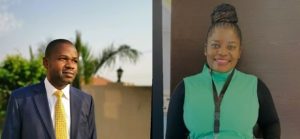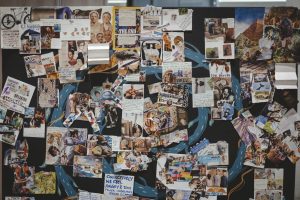“The #ShiftThePower agenda is a liberation agenda” – interview with Dzikamai Bere, ZimRights
12 Feb 2024
This blog originally appeared in Alliance magazine’s special feature on the #ShiftThePower Global Summit.

(L – R): Dzikamai Bere, ZimRights & Tarisai Jangara, Africa Philanthropy Network
I was filled with excitement when I crossed paths with the Zimbabwe Human Rights Association (ZimRights) at the #ShiftThePower Global Summit in Bogotá, Colombia.
As someone who had transitioned from the mainstream media industry to the development sector, ZimRights was the very first organization I had the opportunity to work with back then in 2013. They are a remarkable grassroots movement in Zimbabwe, consisting of ordinary individuals who are passionate about human rights. With a membership of over 250,000 people, ZimRights has become the largest grassroots movement in the country since its establishment in 1992.
Their primary focus has always been on empowering communities and individuals with the necessary knowledge and tools to actively participate in the protection and promotion of human rights. Over the past 32 years, ZimRights has achieved this through various means such as civic education, legal aid support, psycho-social assistance, and community advocacy strategies. Their ultimate goal has been to ensure that even the most marginalized communities have their basic rights realized.
During the Summit, I was curious to reconnect and understand how ZimRights’ work aligned with the #ShiftThePower movement. Fortunately, I had the privilege of interviewing Dzikamai Bere, the National Director of ZimRights, who shed light on their current strategy known as the Shifting Power to the People Strategy (SP2P). He explained that this strategy resonated deeply with the discussions at the Summit.
According to Dzikamai, their strategic priorities revolve around building a critical mass and achieving sustainability. ZimRights aims to move away from the traditional top-down approach to human rights, which often portray citizens as passive recipients of rights bestowed upon them by the State and the elite. Instead, their SP2P strategy focuses on two fundamental pillars: people-centredness and a struggle approach to human rights.
In our interview, Dzikamai explained how ZimRights planned to implement its strategy and the impact it hoped to achieve. It was truly inspiring to hear how ZimRights is empowering communities, as well as their commitment to challenging the existing power dynamics that hinder the realization of human rights for all.
Tarisai Jangara (TJ): It’s great to have this opportunity to speak with you Dzikamai. How did ZimRights come to be a part of the #ShiftThePower Global Summit?
Dzikamai Bere (DB): In 2022, we launched our five-year strategy called the Shifting Power to the People Strategy (SP2P). This strategy focuses on building a critical mass to advance a people-centred human rights agenda in Zimbabwe. The decision to develop this strategy came after a period of introspection and a strong demand from our members to prioritize the people. There was a perception that ZimRights had fallen victim to elite capture creating a Secretariat that was in the pocket of the donors with no motivation for shifting the power. The SP2P became a commitment to work together to shift power back to the people. Our vision is a society in which communities actively lead in creating and sustaining a culture of human rights. This places emphasis on “community leadership.”
Given this, our strategic plan aligned perfectly with the #ShiftThePower Global Summit, which we learned about through our involvement in the Reimagining Peacebuilding Community and then received support to participate from Peace Direct.
TJ: What specific aspects of the Summit stood out for you the most and why?
DB: Two of our values in the SP2P are activism and community. I found both at the Summit. I was amazed by the growth of the movement and realized that many of us are interested in approaching development differently. There is a whole community out there that shares our vision of how development must work for the most marginalized. Sometimes, it can feel lonely and challenging when you are pushing for a specific agenda, such as shifting power to the people.
Secondly, the diverse wealth of knowledge gathered at a global level really struck me. This was highlighted through poster presentations and bucket sessions. I was able to draw practical examples of models that other organizations are using to shift power. One quote that resonated with me at the Summit is that: “It’s not enough to promote the #ShiftThePower agenda at a national level if we continue to replicate toxic power dynamics and behaviours in communities, stemming from colonial legacies.” Our goal is to dismantle and streamline power dynamics. We want to hold ourselves accountable using the #ShiftThePower Manifesto for Change. We must know, as the country’s biggest and oldest human rights movement, that as we go out there, we possess some power and privilege. We too have the obligation to dismantle it.
Thirdly, the concept of speaking truth to power also caught my attention and made me reflect on how we engage with donors. The call was around being courageous and challenging some of the distasteful behaviours and practices exhibited by donors. Most of these relations are not on an equal footing. Ask yourself, how many times have you been asked to change something in your policy because it did not align with donor expectations, and you did it without question? This is just another way of perpetuating a colonial agenda.
The mantra of “out with the logos and egos” was also powerful. We recently had a meeting where we went to a community without any banners or branded materials. This allowed us to have meaningful conversations with the community as people who just want to make a difference. We tend to believe that displaying all those donor logos at a meeting is a way of showcasing that our brand is trusted. But wait a minute – how do you encourage community philanthropy when your members already think you are overfunded by all those logos? In any case, instead of giving, they will want part of the money from those logos. But at the same time, our own logo can be an unwelcome and vulgar display of power. Out with the logos!
TJ: Which of the nine key points outlined in the #ShiftThePower Manifesto for Change resonates most with your experiences?
DB: The nine points are all powerful and amazing. But if I have to choose, point number nine would be very important for us as a movement. It reads: “Change ourselves. We need both humility and boldness and to be ready to challenge our own power and to listen to and work with others.” We must change ourselves because we are the most important actors in this matrix. We need humility and boldness. We need humility to allow our own power to be challenged and the boldness to also challenge those who wield power over us.
TJ: In light of your experience at the Summit, what actions or changes do you envision for ZimRights in terms of engaging the public about the concept of shifting power and its importance in Zimbabwe?
DB: We need to prioritize civic education to help people understand what shifting power truly means. After I participated in the Summit, a local newspaper published a propaganda article claiming that I had attended a meeting where organizations were being taught “how to topple governments.” This shows that we have a lot of work ahead of us in educating the masses about the fact that shifting power aligns with Africa’s ongoing liberation agenda and is an anti-imperialist agenda.
TJ: What are your hopes and aspirations for ZimRights and the impact you hope to make in the realm of human rights in Zimbabwe?
DB: The most important thing for me is to free the movement from the pangs of non-predictable sources of funds and allow the membership to go beyond mere association with the organization and establish ownership. True ownership will never be achieved with the current imperialistic funding models that perpetuate a colonial imbalance of power.
TJ: Do you have any final thoughts or messages you would like to share regarding ZimRights’ involvement in the #ShiftThePower Global Summit and the future of the organization?
DB: The #ShiftThePower agenda is a liberation agenda. It is a freedom agenda. However, the problem we face is that people with power are addicted to defending their power. The greatest challenge for us is how do we shift that power without violence. That is an invitation to disruptive innovation. The answer to that is the key to the future that we are pursuing.
Interview conducted by Tarisai Jangara, Member Engagement and Communications Manager at the Africa Philanthropy Network.


